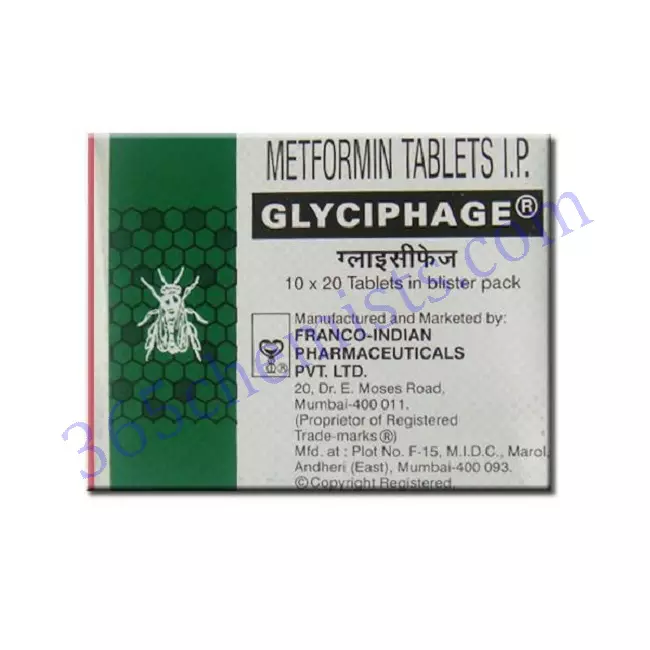Glyciphage 500 Tablet (Metformin 500mg): A Comprehensive Guide
Metformin hydrochloride is the active component of the drug Glyciphage 500 Tablet, which is one of the reasons that it is so commonly given. Patients diagnosed with diabetes mellitus type 2 frequently put it to use in order to bring their excessive blood sugar levels under control. In the following paragraphs, we will discuss the most important aspects of the Glyciphage 500 Tablet, including its applications, dosage, potential adverse effects, and safety precautions.
Key Features of Glyciphage 500 Tablet
- Metformin hydrochloride is the active ingredient in the Glyciphage 500 Tablet. Metformin hydrochloride is an oral antidiabetic medication that is classified as a biguanide. It does this by lowering the amount of glucose that is generated by the liver and increasing the sensitivity of cells throughout the body to insulin.
- Glyciphage 500 Tablet is primarily intended for use in the treatment of diabetes type 2, which is the most common form of diabetes. Individuals who are unable to achieve glycemic control through lifestyle adjustments alone can benefit from its use because it assists in controlling blood sugar levels.
- Dosage: The recommended daily intake of Glyciphage 500 Tablet should be individualised for each patient based on their age, current medical condition, and how well they respond to treatment. Oral administration with meals is the recommended method for minimising adverse effects on the gastrointestinal tract. The initial dose that is typically prescribed for adults is 500 milligrammes taken once or twice daily. However, the dosage may be altered by a healthcare practitioner in accordance with the particular requirements of the individual patient.
- Glyciphage 500 Tablets should be consumed whole with a full glass of water; they should not be chewed or mashed in any way prior to administration. It is essential to carefully adhere to the dosage and administration instructions that have been prescribed to you by your healthcare practitioner or that are listed on the packaging of the medication.
- The Glyciphage 500 Tablet, like any other medicine, has the potential to cause adverse effects in some patients. Symptoms of gastrointestinal distress, such as nausea, vomiting, diarrhoea, and abdominal discomfort, are among the most often reported adverse effects. In most cases, these side effects are minimal and temporary; nonetheless, it is imperative to speak with a medical practitioner in the event that they continue or become worse.
- Individuals who have a known hypersensitivity to metformin or any of the other components of the tablet should not take the Glyciphage 500 Tablet, since this medication should not be taken by these patients. Patients who are suffering from severe kidney or liver illness, congestive heart failure, or respiratory insufficiency are not good candidates for this treatment either. Before beginning treatment with Glyciphage 500 Tablet, it is essential to discuss any preexisting medical problems, drugs that are currently being taken, or allergies with your healthcare provider.
Related Product
Glyciphage 250mg Tablet
Glyciphage 500mg Tablet
Glyciphage 850mg Tablet
Glyciphage SR 1gmTablet
Glyciphage SR 500mg Tablet
Glyciphage SR 850mg Tablet
Glyciphage G 1 Forte Tablet
Glyciphage G 2 Forte Tablet
Glyciphage G 1 Tablet
Glyciphage G 2 Tablet
Glyciphage PG 1 Tablet
Glyciphage PG 2 Tablet
Glyciphage VG1 Tablet
Glyciphage VG2 Tablet
Uses of Glyciphage 500 Tablet
The primary application of the Glyciphage 500 Tablet is in the administration of treatment for diabetes mellitus type 2. It does this by decreasing the amount of glucose that is produced by the liver and by enhancing the body’s reaction to insulin. This, in turn, helps to keep blood sugar levels under control. Glyciphage 500 Tablet can help contribute to better glycemic control and minimise the risk of long-term problems associated with diabetes when it is coupled with a healthy diet and regular exercise. Glyciphage is available in tablet form.
Dosage and Administration
Individual factors such as age, renal function, and how well a patient responds to treatment can cause the recommended dosage of Glyciphage 500 Tablet to shift slightly from time to time. It is absolutely necessary to take the medication exactly as directed by the healthcare professional, including in terms of the dosage and how it should be administered. To reduce the likelihood of experiencing any adverse effects on the gastrointestinal tract, the tablet should be swallowed with food.
Common Side Effects
It is possible that the Glyciphage 500 Tablet will induce some negative effects in certain people. The symptoms of nausea, vomiting, diarrhoea, and abdominal discomfort are the ones that patients report experiencing as their primary gastrointestinal side effects the most frequently. These adverse reactions are typically moderate and short-lived, and they go away as the body becomes accustomed to the medication. It is recommended that you speak with a healthcare practitioner in the event that these adverse effects continue or become problematic.
Rare but Serious Side Effects
In extremely unusual circumstances, using Glyciphage 500 Tablet could result in potentially serious adverse consequences. Among these is lactic acidosis, which is a very uncommon but potentially fatal illness that is characterised by an accumulation of lactic acid in the body. Lactic acidosis can cause a variety of symptoms, including fast breathing, soreness in the muscles, weakness, stomach discomfort, disorientation, and an irregular pulse. In the event that any of these symptoms manifest themselves, it is imperative that prompt medical assistance be sought.
Precautions and Warnings
It is extremely important, prior to beginning treatment with Glyciphage 500 Tablet, to inform the healthcare practitioner about any preexisting medical problems, ongoing drugs, or allergies that you may have. This will assist ensure that the medication is used in a way that is both safe and effective. Individuals who have a known hypersensitivity to metformin or any of the other components of the Glyciphage 500 Tablet should not take the medication because it is not safe for them to do so. Patients who have compromised renal function, hepatic illness, or congestive heart failure should also be treated with extreme caution when using this medication.
Conclusion
Glyciphage 500 Tablet, also known as Metformin 500mg, is an oral antidiabetic medicine that is frequently used for the management of diabetes mellitus type 2. By lowering the amount of glucose produced in the liver and increasing its sensitivity to insulin, it contributes to the regulation of blood sugar levels. Glyciphage 500 Tablet may induce gastrointestinal side effects, however it is normally well tolerated. These side effects are often modest and only last a short time. Even though serious adverse effects are uncommon, prompt medical intervention is still required. For the best possible outcomes, it is essential to adhere to the specified dosage as well as any precautions that were suggested by the healthcare practitioner. In order to make sure that you are using Glyciphage 500 Tablet in a way that is both safe and effective, you need to have regular monitoring and check-ins with a medical practitioner.












